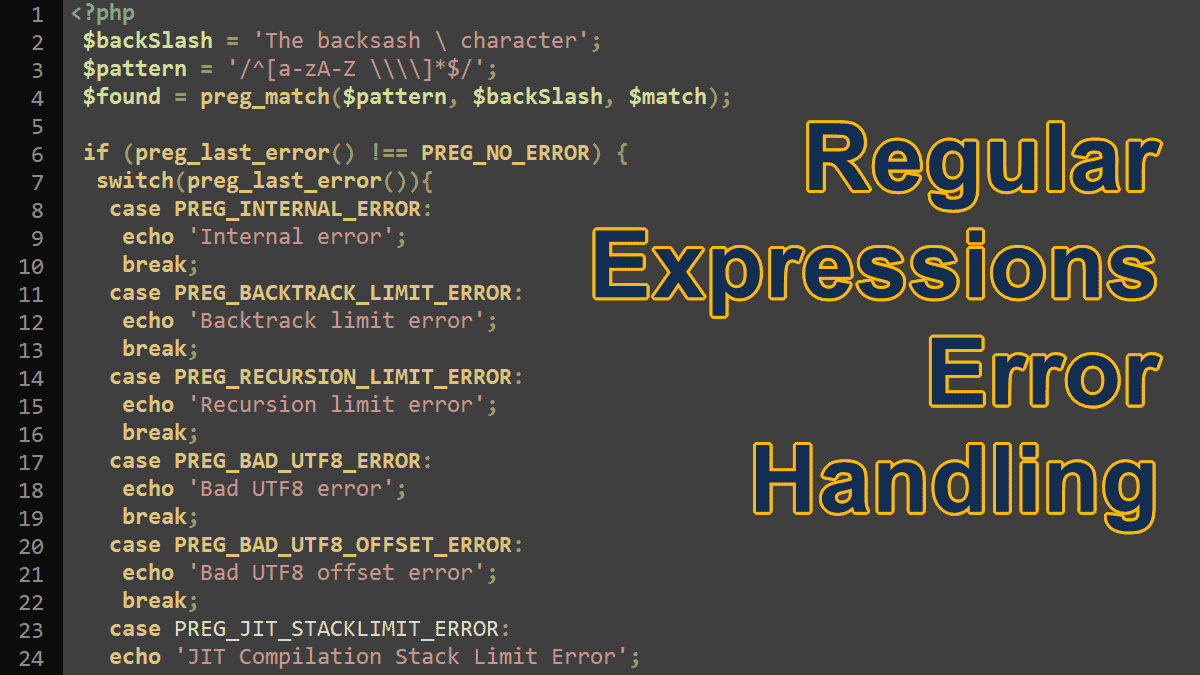preg_last_error
<?php //Syntax preg_last_error(): int
The preg_last_error() function does not take any parameter, it returns one of the following constants:
PREG_NO_ERROR
Returned if there were no errors.PREG_INTERNAL_ERROR
Returned if there was an internal regex error.PREG_BACKTRACK_LIMIT_ERROR
Returned if backtrack limit was exhausted, the default limit is 1000000.PREG_RECURSION_LIMIT_ERROR
Returned if recursion limit was exhausted, the default limit is 100000.PREG_BAD_UTF8_ERROR
Returned if the last error was caused by malformed UTF-8 data (only when running a regex in UTF-8 mode).PREG_BAD_UTF8_OFFSET_ERROR
Returned if the offset didn’t correspond to the begin of a valid UTF-8 code point (only when running a regex in UTF-8 mode).PREG_JIT_STACKLIMIT_ERROR
Returned if the function failed due to limited JIT (just-in-time compilation) stack space, the default limit is 1.
Example: Check whether the regular expression is successful
<?php
$backSlash = 'The backsash \ character';
$pattern = '/^[a-zA-Z \\\\]*$/';
$found = preg_match($pattern, $backSlash, $match);
if (preg_last_error() === PREG_NO_ERROR) {
//Proceed, no errors
}
Example: Determine the error type in a regular expression
If you’re using PHP8 or above, use preg_last_error_msg() function instead.
<?php
$backSlash = 'The backsash \ character';
$pattern = '/^[a-zA-Z \\\\]*$/';
$found = preg_match($pattern, $backSlash, $match);
if (preg_last_error() !== PREG_NO_ERROR) {
switch(preg_last_error()){
case PREG_INTERNAL_ERROR:
echo 'Internal error';
break;
case PREG_BACKTRACK_LIMIT_ERROR:
echo 'Backtrack limit error';
break;
case PREG_RECURSION_LIMIT_ERROR:
echo 'Recursion limit error';
break;
case PREG_BAD_UTF8_ERROR:
echo 'Bad UTF8 error';
break;
case PREG_BAD_UTF8_OFFSET_ERROR:
echo 'Bad UTF8 offset error';
break;
case PREG_JIT_STACKLIMIT_ERROR:
echo 'JIT Compilation Stack Limit Error';
break;
}
}
preg_last_error_msg
<?php //Syntax preg_last_error_msg(): string
The preg_last _error_msg() function was introduced in PHP 8, in previous visions of PHP users only rely on preg_last_error(), which returns error codes. You can use this function if you want friendly error messages instead of just error codes.
<?php
$backSlash = 'The backsash \ character';
$pattern = '/^[a-zA-Z \\\\]*$/';
$found = preg_match($pattern, $backSlash, $match);
if (preg_last_error() !== PREG_NO_ERROR) {
echo preg_last_error_msg();
}
More Regular Expressions Tutorials:
- Regular Expressions
- Matching patterns using preg_match() and preg_match_all()
- Splitting long paragraphs using preg_match_all() function
- Cleanup Text by Removing Extra Spaces (Except Newlines)
- Search and replace with preg_replace() and preg_filter()
- Search and replace with preg_replace_callback() and preg_replace_callback_array()
